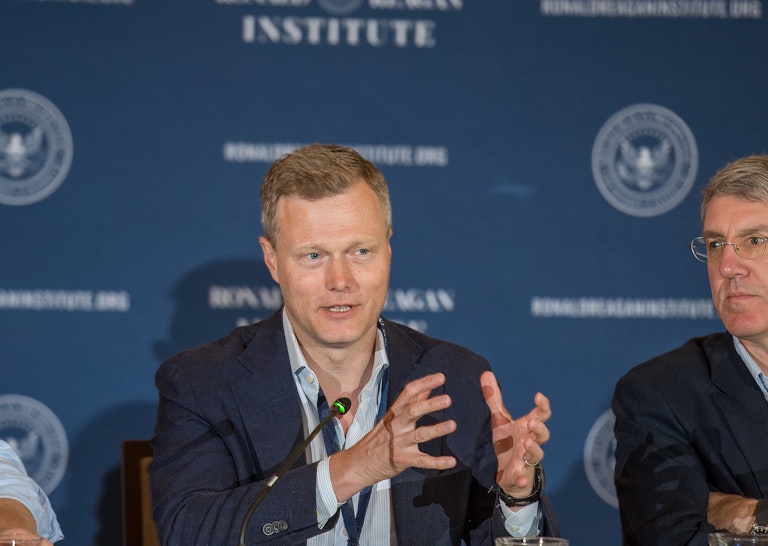Ronald Reagan Institute
American Realism is Unrealistic
By Matthew Kroenig

Will Inboden situates the 1976 “Morality in Foreign Policy” plank of the Republican platform as a reaction to the realism of Nixon and Ford. For the past half century, Republicans have correctly understood that both power and ideals have an important role to play in American foreign policy. But now, a new camp is emerging within the Republican Party that invokes realist theory to counsel a foreign policy of “restraint.”
This essay will argue that, then and now, pursuing an American foreign policy without a moral compass cannot win support of the American people, underappreciates the sources of American power, and fails to advance core American interests. In short, American realism is unrealistic.
To be sure, realists are correct about a few big things.1 The world is dangerous, states act in their own self-interest, and military power matters.
But realism goes too far in rejecting ideals (including freedom and human rights) and regime type (such as the distinction between democracy and autocracy) as important forces in international relations. Instead, they hold that all countries are amoral power seekers, and that democratic leaders and dictators behave in similar ways on the global stage. Realists also believe that a balance of power is the natural state of the international system, and that it is inevitable (and desirable) for the United States to relinquish leadership of the global system it built and defended for the past 80 years.
Realist theory works fine for academic debates, but it is a poor guide to U.S. foreign policy for four reasons.
First, a successful American foreign policy requires public support, and the American people want a moral component to their foreign policy. The 2025 Reagan Institute Summer Survey, for example, found that 83 percent of Americans (including 81 percent of Republicans) believe it is important to “stand up for human rights and democracy.”2 In trying to pursue a realist foreign policy, Henry Kissinger often complained that American democracy got in the way, but the (very fortunate) reality is that America is a democracy.3 It is unrealistic to ignore that.
Republican leaders have accordingly often sold their policies to the American public by emphasizing the moral dimension. Ronald Reagan framed the Cold War as a battle between the free world and an evil empire.4 George H. W. Bush, often described as a realist, appealed to moral principles in making the case for pushing Saddam Hussein out of Kuwait.5 George W. Bush framed the war on terror as a clash between good and evil and advanced the “freedom agenda” as part of the solution.6 Mike Pence, Mike Pompeo, Nikki Haley, and other officials in Trump’s first term correctly framed the U.S.-China competition in moral terms, citing, for example, China’s crimes against humanity in Xinjiang.7
Second, realists argue that democracy promotion is an ideological crusade, but the prudent promotion of democracy and human rights advances concrete American interests. Political scientists find that democratic countries are less likely to become American security rivals; more likely to sign and comply with international agreements; less likely to systematically prey on the global economic system; and more likely to respect the human rights of their people.8 The United States benefits by shaping a world safe for democracy.
To be sure, democracy promotion is not a vital interest; it is not one that alone is worth going to war over. It has also sometimes been oversold, including in the wars in Iraq and Afghanistan. But this is an argument for rebalancing, not abandoning, this important interest. When and where Washington can make a difference in advancing democracy and human rights at reasonable cost, it should do so.
Third, realists argue that power is the most important driving force in international politics, but their ideological blinders cause them to misjudge the true balance of power by underestimating America’s democratic advantages and China’s autocratic vulnerabilities.9
The United States has the world’s largest and most innovative economy and sits at the center of global finance because of its free, open-market system. In contrast, China’s most significant economic (strengths and) vulnerabilities result from the autocratic penchant for excessive and arbitrary state intervention in the economy. Xi Jinping has cracked down on China’s tech sector in order to increase his political control, for example, but at the cost of stifling Chinese economic innovation.10
On the basis of its values and system of government, the United States leads an alliance of more than 30 (mostly democratic countries) that combined possess more than 50 percent of global GDP. China has increased its influence around the world in recent decades, but dictatorships do not forge deep and trusting alliances. Fearful of what China stands for, much of the free world is now moving to balance against China.
In security matters, China’s greatest threat comes not from the Pentagon but from its own people. It spends more on internal repression than on its national defense.
Not recognizing these significant democratic advantages and autocratic weaknesses, realists often misjudge the balance of power. They see America as weak and adversaries as strong. They argue the best Washington can do is to seek accommodation with hostile, autocratic great powers. Nixon and Ford pursued “détente” with the Soviet Union, and today’s realists argue that Washington must radically scale back its ambition in major world regions as it seeks a “decent peace” with China.11 But it is unrealistic to cede important interests to adversaries based on a misreading of the balance of power.
In contrast, Reagan during the Cold War, and many Republicans today, more attuned to the true balance of power, correctly declare that the goal of great power competition should be: “We win, they lose.”12
Fourth and finally, realists confuse the balance-of-power predictions of realist theory for the American interest. Realist theory maintains that the natural state of the international system is a balance of power among the great powers, each exercising dominion within its own sphere of influence. They have always found, therefore, the U.S.-led global system hard to understand. They have consistently predicted catastrophic outcomes from American overstretch.13 They foresee (and advocate for) the near-term end of American “dominance” and the rise of a multipolar global order.14
But this theory is inconsistent with the evidence. America is a rising, not a declining, power, now possessing 26 percent of global GDP, its largest share in two decades.15 The U.S.-led order has been beneficial to the world and to the American people over the last 80 years: no great power war; a fivefold increase in standards of living around the world and in the United States; and an eightfold increase in the number of democratic countries. The world (and America) is safer, richer, and freer because of U.S. global leadership.16
Efforts to reduce America’s role usually backfire because hostile actors fill the vacuum left by American withdrawal. Détente and the Nixon Doctrine emboldened the Soviet Union and scared America’s allies and partners. Obama’s efforts to “lead from behind” led to Russia’s invasion of Ukraine, China’s taking contested territory in the South China Sea, and ISIS’s rise in the Middle East. Biden wanted to park problems in Europe and the Middle East to focus on the Indo-Pacific and instead invited and received wars in the former and increased aggression in the latter.
These are some of the lessons from theory and history of morality in American foreign policy, but what does the future hold and how will the Trump 2.0 administration address these challenges?
Stephen M. Walt, The Origins of Alliances, Cornell Studies in Security Affairs (Ithaca, NY: Cornell University Press, 1987); Kenneth N. Waltz, Theory of International Politics (New York, NY: McGraw-Hill, 1979).
“Reagan Institute Summer Survey,” Ronald Reagan Presidential Foundation & Institute, June 2024, https://www.reaganfoundation.org/reagan-institute/press-releases/new-reagan-institute-survey-americans-reject-isolationism-embrace-american-leader.
Henry A. Kissinger, “A Strong Foreign Policy for a Confident America,” speech to the Downtown Rotary Club, Phoenix, AZ, April 23, 1976, Gerald R. Ford Presidential Library, https://www.fordlibrarymuseum.gov/sites/default/files/pdf_documents/library/document/0204/7368359.pdf.
Ronald Reagan, “Address to the National Association of Evangelicals,” speech to the National Association of Evangelicals, Orlando, FL, March 8, 1983, Ronald Reagan Presidential Foundation & Institute, https://www.reaganlibrary.gov/public/2020-06/2-evangelical-final.pdf.
George H. W. Bush, “Address Before a Joint Session of the Congress on the Persian Gulf Crisis and the Federal Budget Deficit,” September 11, 1990, The American Presidency Project, https://www.presidency.ucsb.edu/documents/address-before-joint-session-the-congress-the-persian-gulf-crisis-and-the-federal-budget.
“Freedom Agenda,” The White House, last updated December 10, 2008, https://georgewbush-whitehouse.archives.gov/infocus/freedomagenda/.
“Before Leaving Office, Mike Pompeo Accused China of Genocide,” The Economist, January 23, 2021, https://www.economist.com/china/2021/01/23/before-leaving-office-mike-pompeo-accused-china-of-genocide; “Remarks by Vice President Pence on the Administration’s Policy Toward China,” The White House, October 4, 2018, https://trumpwhitehouse.archives.gov/briefings-statements/remarks-vice-president-pence-administrations-policy-toward-china/; Nikki Haley, “How to Confront an Advancing Threat From China,” Foreign Affairs, July 18, 2019, https://www.foreignaffairs.com/china/how-confront-advancing-threat-china.
Michael Doyle, “Kant, Liberal Legacies, and Foreign Affairs,” Philosophy & Public Affairs (1983); Amartya Sen, “Democracy as a Universal Value,” Journal of Democracy 10, no. 3 (July 1999): 3–17, https://www.journalofdemocracy.org/articles/democracy-as-a-universal-value/; Helen V. Milner, “The Political Economy of International Trade,” Annual Review of Political Science 2 (1999): 91–114, https://www.annualreviews.org/content/journals/10.1146/annurev.polisci.2.1.91.
Matthew Kroenig, The Return of Great Power Rivalry: Democracy versus Autocracy from the Ancient World to the U.S. and China, (Oxford: Oxford University Press, 2020).
Donny Kwok and Scott Murdoch, “Beijing's regulatory crackdown wipes $1.1 trillion off Chinese Big Tech,” Reuters, July 12, 2023, https://www.reuters.com/technology/beijings-regulatory-crackdown-wipes-11-trln-off-chinese-big-tech-2023-07-12/.
Elbridge A. Colby, “Only One Priority Makes Sense for American Foreign Policy,” American Compass, June 25, 2024, https://americancompass.org/only-one-priority-makes-sense-for-american-foreign-policy/.
Matthew Kroenig and Dan Negrea, We Win They Lose: Republican Foreign Policy and the New Cold War (New York: Republic Book Publishers, 2024); Ronald Reagan, response to Richard V. Allen’s question, 1977, quoted in “The Vision Thing: ‘Here’s my strategy on the Cold War—We win, they lose,’” Miller Center, accessed June 11, 2025, https://millercenter.org/issues-policy/foreign-policy/the-vision-thing.
John J. Mearsheimer, The Great Delusion: Liberal Dreams and International Realities (New Haven, CT: Yale University Press, 2018); Stephen M. Walt, The Hell of Good Intentions: America’s Foreign Policy Elite and the Decline of U.S. Primacy (New York: Farrar, Straus and Giroux, 2018).
Stephen M. Walt, The Hell of Good Intentions: America’s Foreign Policy Elite and the Decline of U.S. Primacy (New York: Farrar, Straus and Giroux, 2018); Stephen Wertheim, “The Price of Primacy: Why America Shouldn’t Dominate the World,” Foreign Affairs, February 10, 2020, https://www.foreignaffairs.com/articles/afghanistan/2020-02-10/price-primacy.
World Bank data, GDP (Current US$) – World, United States, accessed June 10, 2025, https://data.worldbank.org/indicator/NY.GDP.MKTP.CD?locations=1W-US.
Ash Jain and Matthew Kroenig, “Present at the Re-Creation: A Global Strategy for Revitalizing, Adapting, and Defending a Rules-Based International System,” Atlantic Council, October 30, 2019, https://www.atlanticcouncil.org/in-depth-research-reports/report/present-at-the-re-creation/.
Join Our Newsletter
Never miss an update.
Get the latest news, events, publications, and more from the Reagan Institute delivered right to your inbox.
